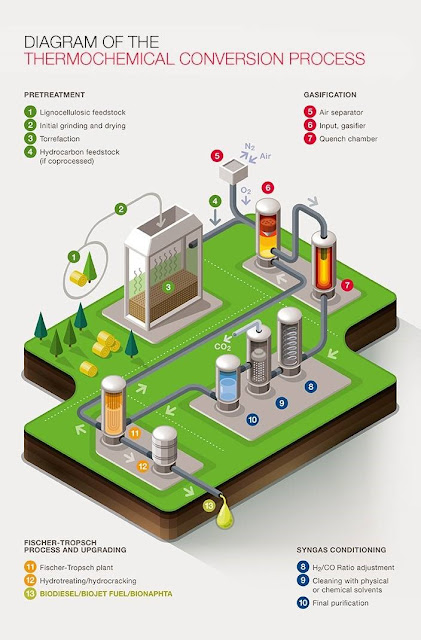BioTfueL project – 2G biofuels via thermochemical conversion
PROJECT FACTSHEET
Partners
|
|
Budget
|
€112.7 million (€33.3 million in public
funding)
|
Feedstocks
|
Lignocellulosic biomass (straw, forest waste,
dedicated energy crops)
|
Platform
|
Termochemical - Syngas
|
Technologies
|
Torrefaction, gasification and Fischer-Tropsch
synthesis
|
Products
|
Renewable diesel and jet fuel
|
Capacity target
|
200,000 metric tons per year
|
Date for market launch
|
2020
|
Location of the demonstration units
|
Pretreatment: Sofiprotéol’s site in Venette (France).
Gasification, purification and synthesis:
Total’s site in Dunkirk (France).
|
GENERAL INFORMATION
Total is working in two large
projects for retrofitting its conventional facilities with biorefining
technologies. The first one is the transformation of the La Mède refinery into
a HVO (Hydrotreated
Vegetable Oil) plant. The plans were unveiled in April 2015 and entail an
investment of €200 million to produce 500,000 metric tons per year of
high-quality renewable diesel. The second one is the initiative covered by this
post: the BioTfueL project.
BioTfueL, launched by Total and five
partners, is focused on developing and marketing an end-to-end chain of technologies
for converting biomass into second-generation biofuels via thermochemical
conversion. The process can also convert fossil feedstock mixed with biomass to
ensure a continuous supply despite seasonal variations in biomass availability.
The high quality biofuels produced using this process chain will be free of
sulphur and aromatic compounds and technically suitable for use in all types of
diesel and jet engines. The partners’ goal is to produce 200,000 metric tons of
renewable diesel and jet fuel per year from one million metric tons of biomass
by 2020. The BioTfueL project also examines the possibility of locating
pretreatment units in regions that have an abundant supply of biomass, so as to
densify biomass material early on in the production process.
After five years of R&D, the
project entered a new phase with the construction of the demonstration units
that are expected to come on stream later this year. The pretreatment will take
place at Sofiprotéol’s site in Venette whereas the subsequent process steps will
be performed at Total’s site in Dunkirk. The demonstration units will validate
the technical and economic feasibility of the technologies and optimize their
energy efficiency and environmental impact. On completion of the project, the
process chain will be ready for the transition to industrial-scale production.
Figure 1. BioTfueL process (extracted from Total web page)
THE PROCESS
1. Biomass pretreatment
The biomass is pretreated, dried and
pulverized so that it can be injected under pressure into a gasifier via
fluidization and pneumatic conveying. The specific pretreatment to be used is
the torrefaction, a mild thermal process (250-300ºC) at inert atmosphere and atmospheric
pressure and with a residence time between 20 and 60 minutes. The product obtained
must be easy to grind without facing considerable mass losses and homogeneous.
2. Gasification
Once the pretreated biomass has been
ground into a powder, it is transported to the gasifier. There, it is exposed
to very high temperatures (1,200 - 1,600ºC) in the presence of oxygen to
convert it into syngas. The gasification reactions take place under a pressure
of 30 - 42 bar and achieving a conversion of more than 99% takes less than two
seconds. A pressurized entrained-flow gasifier has been selected because it
offers high levels of treatment capacity, great flexibility in terms of
feedstock and a very pure syngas. The synthesis gas leaves the reactor at the
bottom and it is cooled down by a water quench to about 220ºC. This gasification
technology of ThyssenKrupp Industrial Solutions (PRENFLO)
is already used commercially to treat fossil fuel feedstock. However,
significant changes are required to enable the injection of biomass into the
gasifier, either alone or mixed with fossil fuel feedstock in varying
proportions.
3. Syngas clean up and conditioning
To be converted into liquid fuel,
the syngas must be very pure and have the correct chemical composition. Indeed,
the syngas produced in the gasifier has a low H2/CO (0.5-0.7) ratio
when compared with the requirement of the Fischer-Tropsch (FT) reactor (almost
2), hence Water Gas Shift (WGS) reaction is performed on a part of the syngas. The
CO2 formed is removed with H2S and other impurities using
an Acid Gas Removal (AGR) unit. Since the FT catalyst requires very low levels
of impurities, a final purification step is performed with guard beds (chemisorption).
4. Fischer-Tropsch (FT) synthesis and upgrading
The FT process converts purified
syngas into a mixture of hydrocarbons. This step is followed by hydrocracking
and hydro-isomerization stages in order to get final products: mainly middle
distillates (diesel and jet fuel) and naphtha. Unlike the first three stages
described above, no R&D work will be carried out on the FT process during
the BioTfueL project, because this process is already available commercially.
The technology is the GaselTM
process (developed by IFP Energies nouvelles, ENI and Axens). This technology
involves a cobalt catalyst, maximizing the production of middle distillates
into a slurry bubble column reactor.
_________________________________________________________________________________
REFERENCES
1 www.total.com/en/energy-expertise/projects/biomass/biotfuel-converting-plant-wastes-into-fuel
(accessed on 13rd June).
2 www.ifpenergiesnouvelles.com/News/Specific-issues/Second-generation-biodiesel-and-biojet-fuel-IFPEN-partner-of-BioTfueL-project
(accessed on 14th June).
3 J.-C. Viguié et al.: “BioTfueL Project: Targeting the Development of Second-Generation
Biodiesel and Biojet Fuels”. Oil & Gas Science and Technology – Rev.
IFP Energies nouvelles, Vol. 68 (2013), No. 5, pp. 935-946.





